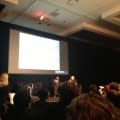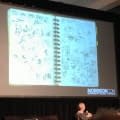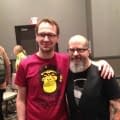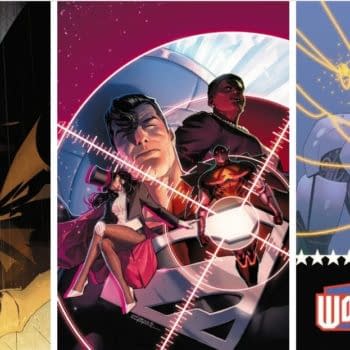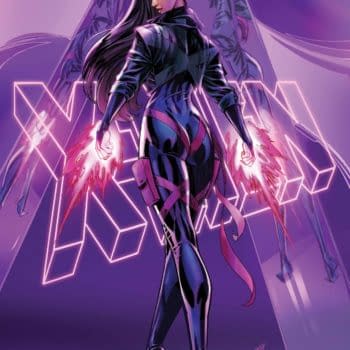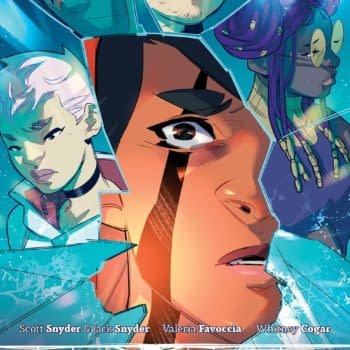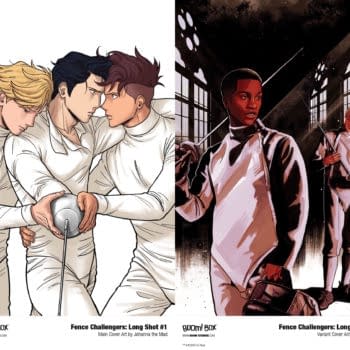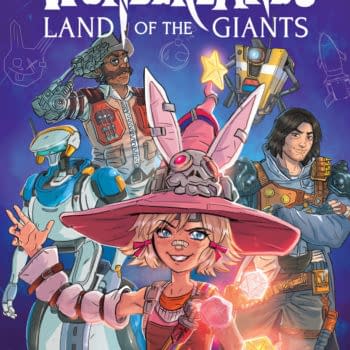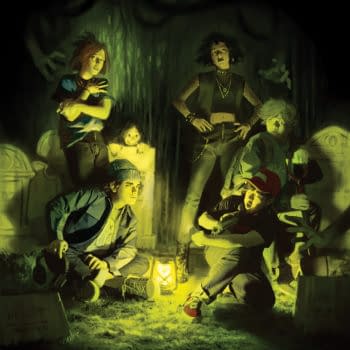Posted in: Comics | Tagged: grant morrison, las vegas, morrisoncon
MorrisonCon In Pictures
Thomas Allard writes for Bleeding Cool;
A few months ago, I wouldn't have entertained the possibility of a convention changing my life; It would have been the same as telling me some random party could have an effect on me. Fair enough, that can happen anywhere but would anyone really expect it to happen at such an event?
Somehow though, after an interview of Morrison I read on Comicbookresources.com I started, against my better judgement, to believe the hype. After all, a "life-changing trip to Vegas" did have a nice ring to it and I did need the vacation. I decided to make arrangements to leave from the 28th to the 30th of September, dates of the convention.
That being said, Morrisoncon doesn't really fit your definition of a convention. Nothing to sell, nothing to promote and with a focus on about a dozen creators, in a very intimate setting, able to welcome 500 to 1000, people puts it at odds with much bigger names such as the New York Comic-Con (116,000), San Diego (130,000) or for someone from Europe and France in particular (like me), the Paris Comic-Con/Japan Expo (208,000).
The panels took the better part of each day from 9AM to 7PM, focusing on the craft and on the creators themselves. The signings, registered in advance, ran alongside it, leaving little time for anything else except the hour we were granted for lunch and the evenings for everyone to party at the Hard Rock's Body English nightclub. This really was more of a con-ference than a con-vention.
The object of this review is not to retell the events of the weekend in acute details. Many people have done it expertly on Bleeding Cool and everywhere else on the net. What I would much rather do is focus on is the vibe that passed through these few days and how it had such an impact on people.
The convention had a very specific audience in mind. Clearly, Morrisoncon wasn't for everyone. It was very polarizing in the sense that either people "got it" or didn't. The event was in no way meant for casual comic book fans, happy to read about their favourite characters' adventures in whatever medium they came, but instead it was an event for people who had a passion of the medium, interested in the craft of the comic book art form and who felt a deep interest in the works of all the authors featured (and not just Morrison's). Both audiences are obviously far from being mutually exclusive, and there was definitely a lot of overlap at the con, whether it was on the side of creators or attendees. The focus, however was narrow, on a niche audience in an already niche medium.
This provided, to me, an even more enjoyable experience as you clearly felt a sense of kinship with the people you would talk to. Many were involved on a professional level in the comic book medium. Aspiring artists and writers, even sometimes "confirmed" writers such as Joe Keatinge were in attendance, as well as retailers. More generally, the people in attendance were interested and interesting. Personally, I believe they were an integral part in making Morrisoncon a success.
Another trait shared by the audience was the decency among the people in attendance. Everyone was thoughtful and considerate, respectful of others, creators and attendees alike. The atmosphere was friendly and laidback, something best demonstrated by the panels. Audience intervention was atypical: no questions were asked on upcoming storylines. However, people asked about magic, art and craft questions, shaving methods, (a game creators played too, as Gerard Way demonstrated when he asked how he could copy JH Williams III's beard). Some used the occasion to recount personal anecdotes they wanted to share with the panel. All was in good fun and nobody complained, respecting the personal moment these people were having.
In the same way, despite the problems that arised from the signing sessions that felt a bit chaotic, I didn't see or hear about anyone making a scene out of it. Everything gave the appearance of a very laidback event. The panels had a feel (and sometimes more than a feel) of improvisation that kept the mood jovial at all times though this might have played against more in-depth discussions, which I might have enjoyed as well on some occasions, but was that really the place?
No doubt the organisers put a lot of work before and during the con to make everything work together, and if there was any incident, we never caught wind of it.
This also applied to the relationship that was created between the audience and the creators. After the panels, you could sometimes hang around in the lounge where creators and attendees would mingle. On the Saturday, I stumbled upon a small group of people that had assembled around a creator talking about one of his projects. Unable to contain his own enthusiasm, he revealed some of his plans. And then asked, naively, I thought at first, for the people not to repeat it. As I heard that, I was ready to make a joke about how it would end up on Twitter in the seconds following that statement. Three weeks later, I have yet to see it repeated anywhere.
This scene also underlines another aspect of Morrisoncon. The way barriers fell between people. How the line between attendants and attendees almost disappeared during this weekend. Besides the featured guests, quite a few other professionals were hanging out at the hotel: Dan Didio and Alex Segura, as well as Mikey Way of My Chemical Romance mingled with the crowd and were always very accessible and friendly.
I'll use this space to also mention that despite most reports depicting Max Landis as a douche, he was one of the nicest and most accessible of them all.
The scene told earlier was no rare occurrence. Creators were very easy to talk to if you weren't blown away just by the mere fact that you were meeting them (which happened to me half the time, I could only take so much awesomeness at once, for a French person who wasn't used to conventions, meeting so many people I admired so much in so little time was a bit overwhelming. I probably ridiculed myself a few times), you could chat with them in a very relaxed way, talking cinema, comics, sometimes even politics. When this happened, it really felt like talking to friends you hadn't seen in a while.
As opposed to many people there, I am not overly familiar with comic book conventions; What kept being mentioned to me however, was how different this felt from their previous experiences. Many shared the same feeling: Morrisoncon really felt like being where you belonged.
Morrison's work has at least two very distinctive features.
The inventiveness and the variety of his stories: Ideas that defy logic (or do they really?) populate the tales he weaves. The unexpected can now happen and nothing is too weird. For some, it becomes incomprehensible, but what can sometimes pass as flow of consciousness writing prepares the mind to welcome the unexpected, to look at things from another angle and not to stay within the rails.
These ideas sometimes come directly from his own esoteric experiences and some use that as an argument to call him crazy and to ridicule him and his readers. I'd answer that to believe in magic is as crazy as believing in God or thinking that there is nothing more to life than what our current knowledge has mapped. However, whether you believe in magic or in the 5th dimension does not matter. What matters is that these concepts allow you to enrich your mind with different ideas, to develop a new perspective on things and not stay imprisoned in the mass mind-set that is available to all in traditional medias and that unifies our thought process.
Born out of that is the positivity that he injects in his work. In We3, the graphic violence on display is counterbalanced by the happy and hopeful ending. In All-Star Superman, the anti-Watchmen, the titular character manages to be a comforting yet inspirational figure at the same time. These works aim to inspire the reader, to allow him to hope and look at the future with confidence again.
In a sense, Morrison's work is very reminiscent of earlier science fiction, the one his mother read when he was a child, which pictured science as a way to improve life for all humanity and the future as a path to a utopia. This was a definitely more difficult outlook to have, as a technology-powered humanity grew more and more conscious of its own shortcomings.
To accept those shortcomings and to dare hope to rise above them is why Morrison's work on superheroes feels to me like a political statement. A way to say that despite it all, this potential that we thought we had is still here and that it only depend on us to exploit it. That we don't have to be resigned about the way things are.
These were the notions that unified the crowd at Morrisoncon. The interest for Morrison's work comes from further than just liking his style and his stories, but more than anything, from his ideas. Those qualities were ever-present and what made the atmosphere so great and Morrisoncon magnified them a thousand fold thanks to the attendees.
The positivity that came out of this touched everyone. People felt energized by the talks that focused on those themes and the shared experience that resulted from them. People felt more confident, empowered, determined, driven to pursue their projects by hearing from the source and its thousand echoes. And who knows, maybe some kind of magic was at work at that moment? There certainly was some alchemy going on.
I don't think you should try and talk about Morrisoncon from a cold and fully reasoned point of view because you could not, nor should you, try to quantify whether it was "worth it". Either you had an experience and enjoyed it, or you didn't. This wasn't about materialism or cold assessment but about something else entirely.
A few months ago, I wouldn't have entertained the possibility of a convention changing my life. However, two weeks later, it feels like a definite possibility that something happened there.










































































































